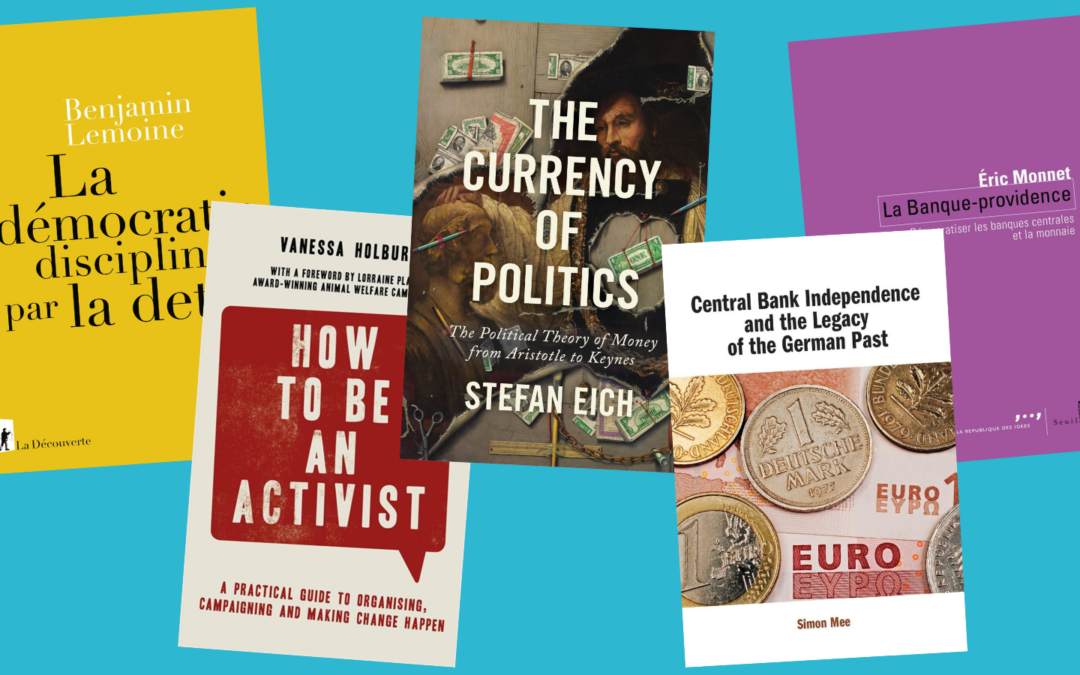In need of some reading ideas for this summer? Look no further! We have compiled a list of books that the Positive Money Europe team has been reading. The topics range from the role of central banks to the intellectual history of money, including a practical guide on how to campaign. Take a look!
1) La démocratie disciplinée par la dette by Benjamin Lemoine
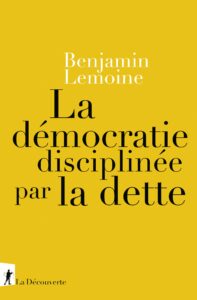 This book centres around the political struggle that surrounds the issuance of public debt. Benjamin Lemoine describes how, over history, the “bondholding class” has had a grip over democracy. Understanding the issuance of public debt as a field of political struggle, Lemoine goes through a broad range of topics such as the distributional impact of public debt, the role that public debt plays in financial markets, the role that the ECB played in the Eurozone crisis, and what can be learnt from the Covid-19 policy response.
This book centres around the political struggle that surrounds the issuance of public debt. Benjamin Lemoine describes how, over history, the “bondholding class” has had a grip over democracy. Understanding the issuance of public debt as a field of political struggle, Lemoine goes through a broad range of topics such as the distributional impact of public debt, the role that public debt plays in financial markets, the role that the ECB played in the Eurozone crisis, and what can be learnt from the Covid-19 policy response.
Why we liked it: Lemoine does a great job of portraying the political conflict that lies behind decisions that are disguised to the public as technical. The asymmetry of power between financial markets and states has become accepted as the natural order of things. This book helps us confront this narrative, and to observe that alternatives exist, as the post-World War II or the Covid-19 crisis experiences show.
2) The Currency of Politics by Stefan Eich
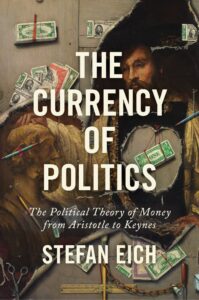 Money is *not* an apolitical mediator of scarcity. It is the creation and object of political power and hence a key concern for political theory. Stefan Eich recovers and articulates money’s lost political promise from Aristotle to Locke, Fichte, Marx, Keynes and the theorists of 20th century. He discusses how money has been viewed as a potential and a challenge to democratic politics. In doing so, he draws a map of various political visions of money that helps orientate the changing role and nature of money today.
Money is *not* an apolitical mediator of scarcity. It is the creation and object of political power and hence a key concern for political theory. Stefan Eich recovers and articulates money’s lost political promise from Aristotle to Locke, Fichte, Marx, Keynes and the theorists of 20th century. He discusses how money has been viewed as a potential and a challenge to democratic politics. In doing so, he draws a map of various political visions of money that helps orientate the changing role and nature of money today.
Why we liked it: The story that Stefan Eich weaves together in the book is brilliant on many accounts. He offers many conceptual and historical resources to better capture the problems of our current monetary system and to more convincingly articulate reasons for its reform. His call to consider money next to law and speech as well as to view it in the light of reciprocity and recognition provides lots of food for thought for how we talk about money and its governance. For us, as an NGO that is guided by Stefan Eich’s remark that central banks are essential sites of political struggle for democratising credit, the book has proved incredibly useful. Everyone who has an interest in the politics of money and related democratic ambitions should read his book.
3) La Banque Providence. Démocratiser les banques centrales et la monnaie by Éric Monnet
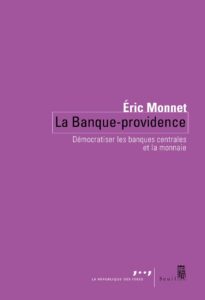 In this short and accessible book, Éric Monnet describes the challenges that central banks face, such as climate change and digital money. Describing central banks as an arm of the welfare state, Éric Monnet shows how central bankers can improve the democratic legitimacy of their decisions through better deliberation with elected authorities.
In this short and accessible book, Éric Monnet describes the challenges that central banks face, such as climate change and digital money. Describing central banks as an arm of the welfare state, Éric Monnet shows how central bankers can improve the democratic legitimacy of their decisions through better deliberation with elected authorities.
Why we liked it: This book is a great starting point for understanding how central banks function. Éric Monnet does a fantastic job of summarizing current debates on the challenges that central banks face in a concise and enlightening way. This last decade has brought a lot of criticism to the action of central bankers. Understanding how democratic legitimacy of central banking can be improved is vital for the road ahead.
4) How to be an activist. A practical guide to organising, campaigning and making change happen by Vanessa Holburn
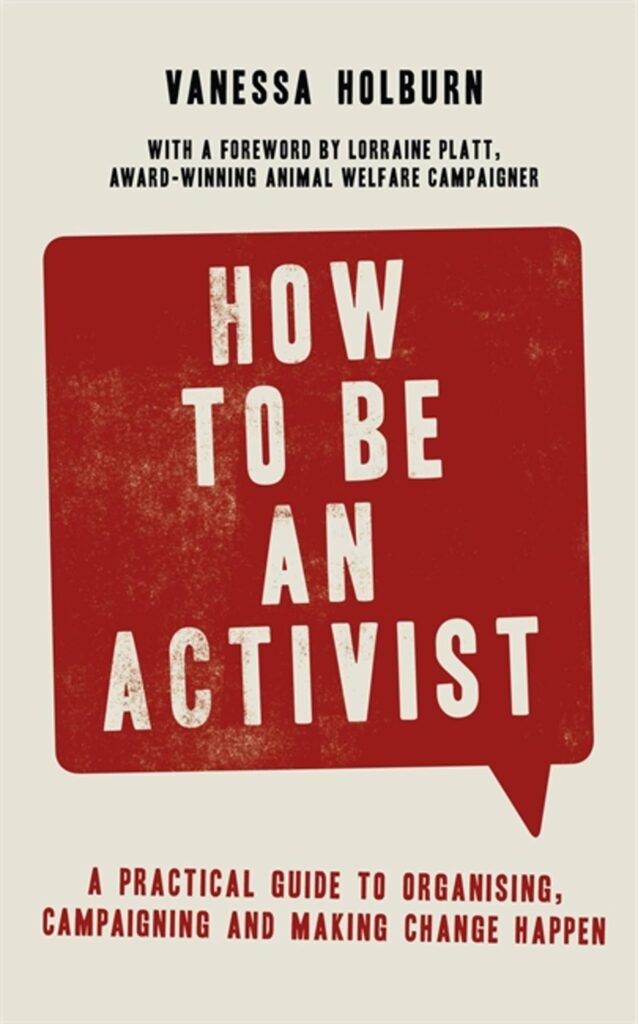 Journalist and campaigner Vanessa Holburn gathers in this very practical book everything you need to know to run a successful social campaign and make change happen. Using very helpful case studies, the author covers all the different steps and tools of a campaign: from how to get started, identify your main messages, involve activists and keep them motivated, to how to interact with the media and political world.
Journalist and campaigner Vanessa Holburn gathers in this very practical book everything you need to know to run a successful social campaign and make change happen. Using very helpful case studies, the author covers all the different steps and tools of a campaign: from how to get started, identify your main messages, involve activists and keep them motivated, to how to interact with the media and political world.
Why we liked it: It’s truly the activists’ bible! And the learnings in this book apply to all kinds of campaigns, from the smallest to the broadest ones.
5) Central Bank Independence and the Legacy of the German Past by Simon Mee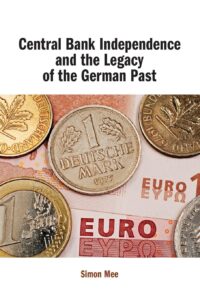
Simon Mee crafts a careful historical analysis of the emergence and the politics of central bank independence in 20th century Germany. He points out the errors in standard stories of why central banks should be independent. For example, the hyperinflation of the 1920s – a watershed moment that supposedly illustrates the need for independent central banks – actually happened under the watch of the independent German Reichsbank. He then discusses how, in the post-WW2 period, Reichsbank officials successfully played the media and the public, using historical myths, to shield themselves from the demands of democratically elected politicians.
Why we liked it: Simon Mee’s book is a great example of historical myth-busting. It shows how the argument for “independence” in the case of the German central bank was rooted in central bankers’ power interests. Furthermore, it also makes clear that central bank independence – the legal immunity of central banks towards government policies – was heavily contested in post-WW2 Germany. Both historical insights are extremely important for stripping the notion of central bank independence of its “holy cow” status and might help us discuss the merits and downsides of central bank independence” more pragmatically.

